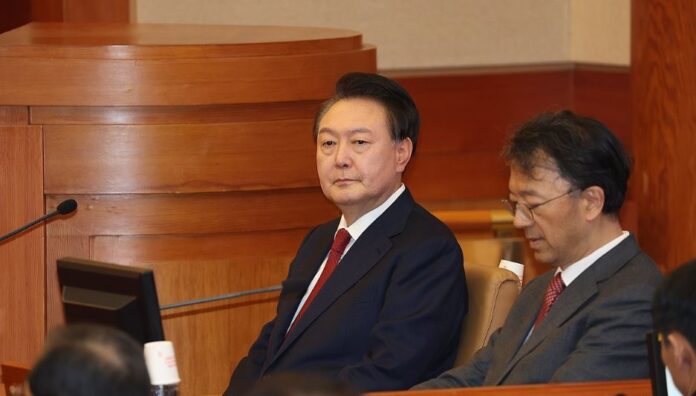South Korea’s impeached president, Yoon Suk Yeol, appeared before the Constitutional Court to defend his controversial declaration of martial law during his brief tenure in December. Yoon, detained on charges of leading an insurrection, denied allegations of ordering military commanders to detain lawmakers. He described the martial law decree as a symbolic warning against purported opposition abuses, rather than a directive for action.
However, his defense faced scrutiny as evidence, including footage of special forces storming parliament and the election commission, contradicted claims that the decree was never intended to be executed.
Also Read: 9-Million-Year-Old Ancestor of Great White Shark Discovered in Peru
On December 14, the National Assembly impeached Yoon with a two-thirds majority, citing violations of constitutional duties. The Constitutional Court now has 180 days to deliberate on the case and determine the former leader’s political fate. Detained South Korean President Yoon Suk Yeol was escorted to the Armed Forces Seoul Capital District Hospital shortly after defending himself in his high-stakes impeachment trial at the Constitutional Court.
The reason behind his admission to the hospital remains a mystery, fueling speculation as his legal battle intensifies over his failed martial law declaration in December. This landmark case continues to captivate the nation, marking a pivotal moment in South Korea’s democratic history.
Key Points:
- Court Appearance:
- Impeached South Korean President Yoon Suk Yeol appeared before the Constitutional Court to defend his martial law declaration from December.
- He is detained on charges of leading an insurrection.
- Martial Law Defense:
- Yoon claimed the decree was a symbolic warning against alleged opposition abuses, not an order for action. Evidence, including footage of special forces storming parliament, challenges this claim.
- Impeachment Details:
- The National Assembly impeached Yoon on December 14 with a two-thirds majority, citing violations of constitutional duties.
- The Constitutional Court has 180 days to determine Yoon’s fate.
- Hospitalization:
- Yoon was taken to the Armed Forces Seoul Capital District Hospital after his trial.
- The reason for his hospitalization is undisclosed, leading to widespread speculation.
- National Impact:
- The case has captured national attention and represents a critical moment in South Korea’s democratic history.



